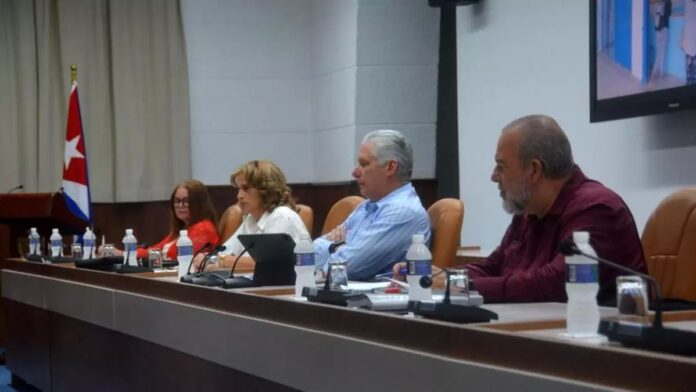
The proliferation of illegal sellers and the scarce and unstable supply of products in gastronomy hamper internal trade on the Island, say the leaders
By 14ymedio
HAVANA TIMES – The balance sheet for Internal Trade in Cuba for 2023, published by the Government this Wednesday, provided only one statistic for the sector: 70% of the construction materials delivery plan was met. The rest of the meeting consisted of an accumulation of “enigmatic formulations, abundant exhortations, a drought of data and scarcity of details about specific programs,” said Cuban economist Pedro Monreal.
The administrative inefficiency of the Ministry of Internal Trade barely motivated a discussion among officials, who mentioned in passing the main problems of the sector: “the proliferation of illegal sellers; the diversion from retail sales as a secondary activity in production companies; the scarce and unstable supply of products and services in gastronomy; the fluctuation and deficient preparation of managers and employees; as well as the ineffectiveness of the measures implemented to prevent and confront crime, illegalities and acts of corruption.”
According to the website of the Cuban Presidency, which summarized the meeting, “the main results achieved in 2023, as well as problems that persist in the sector and proposals to solve them” were exposed in an “audiovisual” that was not made public. “It would be advisable to disclose it because there is a striking ’statistical blackout’ with respect to Internal Trade, due to the absence of the 2022 data,” Monreal commented, while showing the empty printout for that year from the National Office of Statistics and Information (Onei).
Despite the fact that the Government keeps the real figures under lock and key, the latest public speeches – almost all on the distribution of the rationing system’s basic family basket – by the head of the ministry, Betsy Díaz Velázquez, hint at a more chaotic panorama than the regime is willing to admit.
In February, the minister recognized that there were serious difficulties with the purchase and distribution of powdered milk due to the high cost of the product in the international market and the low availability of fuel to deliver it to the warehouses. The distribution at that time depended mainly on donations from the World Food Program (WFP), and weeks later, the Cuban Government requested help from the WFP for the first time due to the pressing need for the product, intended mainly for children, pregnant women and the elderly.
Similar situations have occurred with other rationed foods, such as bread, rice and coffee, which have forced Internal Trade and the Ministry of the Food Industry to offer explanations on Cuban Television.
As for corruption, another mandatory issue in the balance sheet after the announcement that the former Minister of Economy is being investigated for “serious errors made in the performance of his functions” – although the “paquetazo” [package] proposed during his management of the portfolio continues to be implemented – the Government did not offer numbers for global losses, recovery plans or offenders.
However, the recent disclosure by the official press of cases related to embezzlement and illegal sales of products by leaders of state companies – such as the diversion of yogurt in the Río Zaza dairy production company in Sancti Spíritus and the theft of 133 tons of chicken from a state warehouse – give the measure of the current state of the situation.
“This sector is one of those that the population most associates with corruption, and we need to work to eliminate those facts,” admitted the Prime Minister, Manuel Marrero.
Only one element, commercial circulation, “month after month is overfulled,” Marrero said, although the cause is “the increase in prices and not greater offers of products and satisfaction of the demands of the people,” he acknowledged. The comment was criticized by Monreal, who pointed out that “the Government refers to the distortion derived from its own statistics as if it were not its responsibility. There would be no illusion of ’over-compliance’ of commercial circulation if the official statistics included values adjusted to inflation and updated physical data.”
Once again, the strategy of justifying the Government’s mistakes by alleging “economic asphyxiation and media indoctrination” of the United States to “harm the Revolution” was entrusted to President Miguel Díaz-Canel who, in the face of the report of the failures of Internal Trade, asked, paradoxically, to “break the myth that everything State is inefficient.”
Translated by Regina Anavy for Translating Cuba
Read more from Cuba here on Havana Times.




